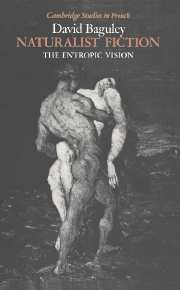Book contents
- Frontmatter
- Contents
- Acknowledgments
- Introduction
- 1 Histories
- 2 Theories: realism, naturalism, genre
- 3 The founding texts
- 4 The tragic model
- 5 Comic strains
- 6 In the ironic modes: naturalist satire and parody
- 7 The ‘scandal’ of naturalism
- 8 Naturalist description
- 9 The entropic vision
- 10 By way of conclusion: two English examples
- Notes
- Translations of passages in French
- Select bibliography
- Index
- Cambridge Studies in French
2 - Theories: realism, naturalism, genre
Published online by Cambridge University Press: 14 October 2009
- Frontmatter
- Contents
- Acknowledgments
- Introduction
- 1 Histories
- 2 Theories: realism, naturalism, genre
- 3 The founding texts
- 4 The tragic model
- 5 Comic strains
- 6 In the ironic modes: naturalist satire and parody
- 7 The ‘scandal’ of naturalism
- 8 Naturalist description
- 9 The entropic vision
- 10 By way of conclusion: two English examples
- Notes
- Translations of passages in French
- Select bibliography
- Index
- Cambridge Studies in French
Summary
‘Writers and readers of certain historical periods’, states Alastair Fowler, ‘have ignored genre. But while doing so, they have unconsciously engaged in generic transactions all the same. In fact, ignoring genre has often meant passively accepting the conventions prescribed by custom and fashion.’ As examples of this process Fowler cites the accommodating attitude of medieval readers to allegory and our own tendency to ‘generalize, without much thought, naturalistic presuppositions and criteria’. We obviously could not charge the age of Darwin and Brunetiere with an indifference to generic problems, but, as far as the naturalist writers of the period are concerned, their particular aesthetic principles, in so far as they were clearly formulated at all, were decidedly unaccommodating to an awareness of the generic features of their literary works. Indeed, as we can clearly see today, their theories are precisely characterised by the assumption of ‘naturalistic’ presuppositions which, then as now, lead to an underestimation of the relevance of generic criteria to an appreciation of the literariness of their texts. There is then, unquestionably, a problem of genre in relation to naturalist aesthetics, which it is the main purpose of this chapter to explore, along with a brief survey of the theories concerned.
The problem is due in part to the fact that there was no coherent, unified body of theory among the naturalists. Not only did the French naturalists, to take them again as our primary object of study, tend, surprisingly so, to be largely indifferent to theoretical questions, but also many of their programmatic statements were in fact directed against the views of Zola, who was supposedly their chief theoretician.
- Type
- Chapter
- Information
- Naturalist FictionThe Entropic Vision, pp. 40 - 70Publisher: Cambridge University PressPrint publication year: 1990

